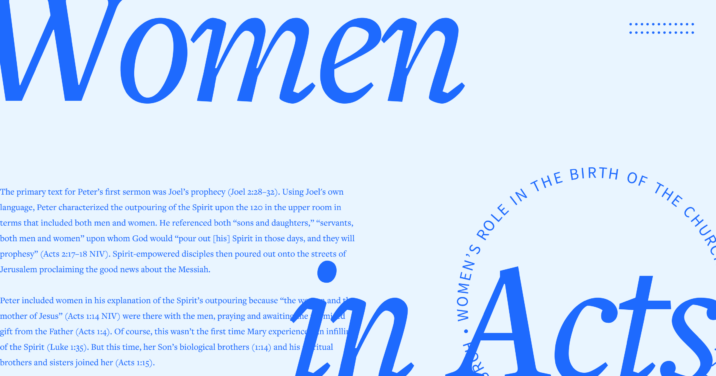Most of us easily recall Mary’s words of submission to the Spirit’s invitation and work: “I am the Lord’s servant. … May your word to me be fulfilled” (Luke 1:38 NIV). The effect of the Spirit’s power coming upon this young woman cannot be overstated. Indeed, the birth of the Savior of the world was a direct result of the Spirit’s life-generating power and Mary’s yes. The help we all needed was finally on its way.
But this profound collaboration between the Spirit and willing women didn’t end there in Nazareth. We see it throughout the ministry of Jesus as he called, included, commissioned, and was supported by women (Luke 8:1–3; John 4:1; 20:17). And we see it in the birth and growth of the earliest church.
Just as Eric Schumacher and I did in our book, Worthy: Celebrating the Value of Women (Bethany House, 2020), let’s scan Acts looking for how the Holy Spirit used women in the establishment of the early church.
Yes, of course, we’re familiar with the way that men were used—but what about the other half of the church? Were they there? Were they important? Did they have value? Was the Spirit’s seminal work in and through Mary repeated in the birthing of this new family of faith?
My hope is that this short article will pique your interest and invite you to see how women were indeed integral to the founding of the church—and so are integral in the flourishing of yours.
Table of contents
Joel’s prophecy fulfilled: both men and women prophecy
The primary text for Peter’s first sermon was Joel’s prophecy (Joel 2:28–32). Using Joel’s own language, Peter characterized the outpouring of the Spirit upon the 120 in the upper room in terms that included both men and women. He referenced both “sons and daughters,” “servants, both men and women” upon whom God would “pour out [his] Spirit in those days, and they will prophesy” (Acts 2:17–18 NIV). Spirit-empowered disciples then poured out onto the streets of Jerusalem proclaiming the good news about the Messiah.
Peter included women in his explanation of the Spirit’s outpouring because “the women and the mother of Jesus” (Acts 1:14 NIV) were there with the men, praying and awaiting the promised gift from the Father (Acts 1:4). Of course, this wasn’t the first time Mary experienced an infilling of the Spirit (Luke 1:35). But this time, her Son’s biological brothers (1:14) and his spiritual brothers and sisters joined her (Acts 1:15).
They “were filled with the Holy Spirit and began to speak in other tongues as the Spirit enabled them” (Acts 2:4). The multilingual prophecy that then filled the streets of Jerusalem rang out through the lips of both women and men. Both men and women echoed Mary’s song of worship in Luke 1:46 as they declared the wonders of God (Acts 2:11). What the Spirit began quietly and singly through Mary in Nazareth now overflowed out onto the streets of Jerusalem and to the gathered nations there.
From the very earliest days of the church, women have been vital to the flourishing of Christ’s bride.
So we see that, beginning with the outpouring on Pentecost, indeed from the very earliest days of the church, women have been vital to the flourishing of Christ’s bride.
The use of “brothers” to mean brothers and sisters
One of the first ways that you’ll begin to notice women’s value and inclusion in the church will be by understanding that the Greek word for “brothers,”1 is often to be properly translated “brothers and sisters” rather than simply “brothers.” The Christian Standard Bible (CSB) has rightly adopted this translation, as well as the NIV, NLT, and NASB (2020). Even the ESV notes in certain instances that this word could be translated “brothers and sisters.”
Practically everywhere in the Bible where we find brothers worshiping and learning, we also find sisters.
Once you understand that in many instances, “brothers” is not gender specific or limited to men, you’ll begin to see how integral women were to the ancient church. In fact, practically everywhere in the Bible where we find brothers worshiping and learning, we also find sisters. Here’s a list of the places where the Greek word for “brothers” is translated “brothers and sisters” in Acts (CSB): 1:15, 16; 2:29; 3:17; 6:3; 11:1; 11:29; 13:26, 38; 15:3, 23, 32, 33, 36, 40, 16:2, 40; 17:10, 14; 18:18, 27; 21:7, 17; 28:14, 15.

Use Logos’s Bible Word Study to find every instance where this word is translated “brothers and sisters” in Acts. Get the Logos app free, if you don’t already have it.
The prevalence of women across Acts
In addition, consider the following additional examples of women’s inclusion and importance in Acts.
- Several passages specifically note that women were counted as believers in the early church (e.g., 5:14).
- Saul recognized that women’s faith was as dangerous as the men’s, for he received permission to imprison both “men or women” (9:2).
- The first person and one of only two people who were raised from death by the apostles was Tabitha, who was “always doing good, helping the poor” (9:36 NIV).
- Women were among those chosen by God to see (and proclaim) the resurrected Christ, a gift not given to everyone. They are included among his witnesses: “he appeared for many days to those who came up with him from Galilee to Jerusalem, who are now his witnesses to the people” (13:31 CSB).
- John Mark’s mother hosted a prayer meeting in her home (12:12) where her servant Rhoda excitedly exclaimed, “Peter is at the door!” (12:14).
- The Holy Spirit empowered the mother–daughter team of Lois and Eunice to stand together in faith (2 Tim 1:5), even though Lois’s husband was not a believer. In a household that may have been filled with conflict, these faithful and brave women persevered in declaring the Scriptures to their fearful and self-doubting son and grandson. In the book of Acts, their ministry enabled Paul himself to be encouraged deeply by Timothy (see Acts 16:3; 19:22). Paul frequently called him “son,” undoubtedly stepping into the role that Timothy’s father had abdicated (1 Tim 1:2, 18; 2 Tim 1:2).
Women’s integral help in spreading the gospel
Now we come to a turning point in the story of Paul’s missionary journeys. Though it had been Paul’s plan to go to Spain, he saw in a vision a Macedonian man pleading for help (16:9). So, Paul changed his plans and traveled to Philippi where he met Lydia, a Gentile God-fearing businesswoman, who became the first baptized convert to Christianity in Europe (16:14–15) and hosted its first church in her home (16:40). Lydia’s house became the helping hub of Christian ministry (16:40) and was probably the church where Paul’s Philippian letter was received and read.
How did God answer the Macedonian man’s cry for help? He did what he has done from the beginning. When Sarah, Ruth, and even Hannah were barren, God created new life within these women, and from their offspring his purposes were achieved. So again in Acts, God once again worked to create new life in a woman, Lydia, and through this woman the European church was born.
Lydia was the prototypical “help meet,” the man’s necessary helper and ally (Gen 2:18, 20). Lydia is a recapitulation of Eve in the Garden (Gen 3:15), Mary in Nazareth (Luke 1:26–38), and her sisters in Jerusalem (Acts 1:14). When brothers need help, when the Spirit is starting a new epoch, he frequently calls, empowers, and commissions a woman to bravely take the first steps.
When the Spirit is starting a new epoch, he frequently calls, empowers, and commissions a woman to bravely take the first steps.
The Spirit’s ongoing ministry through Paul to the Greeks included many women, both slaves (16:16) and prominent ones (17:4, 12). One woman, Damaris in Athens, is important enough to be named along with Dionysius, a member of the Areopagus (17:34).
Priscilla’s outstanding ministry
Later, when Paul traveled to Corinth, he met Aquila and Priscilla (18:1–3), husband and wife expats from Rome who worked together with him as tentmakers. Paul lived with them, partnering together to teach the young church. Then, when he left those brothers and sisters and sailed for Syria, Priscilla and Aquila accompanied him (18:18). After they arrived at Ephesus, Paul left Priscilla and Aquila there to build up the faith of the church (18:19).
Eventually, Apollos, native of Alexandria, came to Ephesus to teach (18:24). When Priscilla and Aquila heard him, they invited him to their home and explained to him the “way of God more accurately” (18:25–26 CSB).
Note the important sequence of their names. Of the six times they are mentioned in the New Testament, twice Aquila’s name comes first (Acts 18:2–3; 1 Cor 16:19), while four times Priscilla’s name takes that place (Acts 18:18, 26; Rom 16:3; 2 Tim 4:19). Naming a woman first was highly unusual and usually signified that the woman had a more prominent role or standing in the circumstance described. When the Bible describes their tentmaking, in all but one reference, Aquila is mentioned first (Acts 18:2–3). In tentmaking, Aquila took the lead. But when they were traveling with Paul (18:18) and teaching Apollos about the Holy Spirit (18:26), Priscilla’s name comes first, apparently because she was the primary teacher.2
The Spirit’s work expanded
Philip the evangelist was one of the first deacons chosen by the church in Jerusalem (6:5). He was originally called to oversee the mercy ministry to destitute believing women in Jerusalem (6:1–6). His first calling was to serve women.
So it shouldn’t surprise us that later on, after he moved to Caesarea, his daughters were known as women who proclaimed the good news like he did (see 8:5; 8:26). He had “four unmarried daughters who prophesied” (21:8–9 NIV). This designation of “prophecy” doesn’t necessitate foretelling of future events, but rather explaining the will of God as they were directed by the Holy Spirit.
The Spirit’s work that had begun in Mary was continuing, this time in Caesarea through a disciple’s unmarried daughters who were prophesying Mary’s song again.
Again, Luke wanted us to know that the Spirit’s work that had begun in Mary was continuing, this time in Caesarea through a disciple’s unmarried daughters who were prophesying Mary’s song again, declaring the wonderful works of God through Jesus Christ.
Even as the book of Acts draws to a close, we hear of both women and men encouraging Paul in his ministry as he traveled to the tribunal in Rome (28:15). In his exhausting travels, Paul was encouraged by both men and women. Think of that.
Mary’s willing yes is still reverberating through women
These days we hear much about discouragement and weariness among pastors and their experience of isolation and need of help. Perhaps part of the weariness has to do with the fact that they haven’t considered how they might use the Spirit-filled, wise, faithful, courageous women in their congregations to assist them in their work.
However, when we view women in the church as sisters following in the footsteps of Mary, Lydia, and Priscilla, called and empowered by the Spirit to help spread the message of the wonderful works of God, we honor them; we see them as precious gifts given by the Spirit to assist the ministry of the church. Pastors, you can and should cherish and use them as you would dear sisters.
Unfortunately, some women have not seen the ways God’s Spirit has historically called and equipped their sisters before them. Many women doubt their own callings and abilities, perhaps even wondering if their desire to offer help in the church is somehow wrong. As a woman who’s been part of the church for more than fifty years, I can attest to hearing many messages about women usurping or sinfully trying to take over men’s roles. I’ve also heard that women are “more easily deceived” than men. This has made me question whether I should offer counsel or wisdom to the brothers in my life who might benefit from it.
Beyond this, many women have been ignored, objectified, and even abused by those who should have welcomed them as wise sisters to be cherished. Perhaps a failure to identify the Spirit’s work in and through women, which we’ve tried to rectify in this article, can lead to discounting their value and opening the door abuse.
But can you see how the Spirit’s work through Mary, Lydia, Priscilla, and others is meant to speak to us today? The Spirit called and empowered these women to help spread the message of his wonderful work, even at a time when women’s voices tended to be silenced and their value certainly questioned. But the Spirit did not silence them. No, he emboldened them. Indeed, when the baby church needed nurture and help, women filled the gap with their faithful love, words, and works.
One closing note: I’m not calling you to change your views on ecclesiastical polity. Rather, as Pastor Eric Schumacher and I wrote in Jesus and Gender: Living as Sisters and Brothers in Christ (Kirkdale, 2022), your polity is a second-tier matter of personal and ecclesial conviction. But after everything you’ve learned in this article, consider: In what ways can you honor and use the gifted women sent by the Spirit to help your congregation? Are there ways you can encourage the women around you to recognize and use their gifts? Is your church like the church we see in the book of Acts?
Each of us needs to remember Mary’s Spirit-engendered song about the Mighty One who has done great things. Will you encourage the women in your own congregation likewise to speak about his “mighty deeds,” how he has “satisfied the hungry with good things and … helped his servant Israel” (Luke 2:51, 53–54)? Isn’t that the very help we all need? Yes, the Holy Spirit continues his life-giving and transforming work today through men and women who, like Mary of old, are still saying “Yes. Let your will be done. No matter what. No matter how much it costs me. I’ll still say yes to you.”
Continue studying women’s integral contribution to church’s mission with these recommendations from Elyse Fitzpatrick
- How God Sees Women: The End of Patriarchy, by Terran Williams
- Are Women Human? Astute and Witty Essays on the Role of Women in Society, by Dorothy L. Sayers
- Through His Eyes: God’s Perspective on Women in the Bible, by Jerram Barrs
Confronting Sexism in the Church: How We Got Here and What We Can Do About It
Regular price: $10.79
The Hope in Our Scars: Finding the Bride of Christ in the Underground of Disillusionment
Regular price: $12.99
Related articles
- 7 Women in the New Testament & Their Example to the Church
- Why Did Jesus Appear to the Women Instead of the Disciples?
- 20 Christian Women Who Shaped Church History
- The Not-So-Hidden History of Faithful Christian Women
- As Michael S. Guyer states, the plural form of this Greek word for “brothers” is often used to include women. In fact, it is “Paul’s primary designation for believers in the church.” Michael S. Guyer, “Brother,” in The Lexham Bible Dictionary (Bellingham, WA: Lexham Press, 2016).
- Elizabeth Glanville, Every Woman’s Bible (Carol Stream, IL: Tyndale House Publishers, 2024), 1391. The other three references to Aquila and Priscilla come in farewell sections of Paul’s letters. Twice Priscilla comes first (Rom 16:3; 2 Tim 4:19), once Aquila comes first (1 Cor 16:19).





